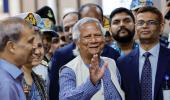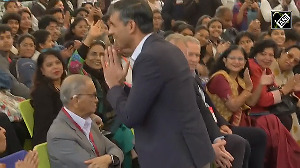The fundamental construct of India's neighbourhood policy still needs to be what Vajpayee postulated, Manmohan Singh embraced, and Modi energised.
It's just that we need to junk domestic politics and excessive religiosity, while acquiring much humility and a renewed respectfulness towards our neighbours, recommends Shekhar Gupta.

The dramatic events in Bangladesh bring the focus back to India's neighbourhood, and the Narendra Modi government's record in dealing with it.
To take a deeper look at what's immediate, we need to begin a quarter-century ago, when Atal Bihari Vajpayee made his big move with Pakistan by taking a bus ride to Lahore.
'You can choose your friends,' he said, 'but you can't choose your neighbours.'
It followed that improving ties with them was imperative.
In 2008, Manmohan Singh took it a step forward with his call of 'neigbourhood first'.
In 2014, Mr Modi also put his stamp on it with his characteristic style, inviting all the leaders of the extended subcontinent to his swearing-in.
He followed this up with visits to the neighbours, often marked by a mood of resurgent euphoria and, in one case, with an extraordinary sense of drama.
This is when he surprised all by breaking a journey in Lahore to greet then-prime minister Nawaz Sharif on his granddaughter's wedding.
There was hope now.
If India's first leader with a majority in 25 years was showing such commitment to improving relationships in the region of seven sovereign nations with multiple divides and tectonic faults, some caused by ideology, all deepened by history, and some Cold War-era debris cluttering them, then it was possible to repair and clean these breaches and build bridges over them.
As Mr Modi's third successive term gets under way, how does his scoresheet look?
Bangladesh is the biggest crisis.
For 15 years now, Dhaka had been India's closest ally.
The pivot to a secure North East for India is located in Dhaka, especially as nobody knows where the centre of gravity is in Myanmar.
Pakistan, meanwhile, has seen dramatic changes, with its new regime almost fully breaking off from India after the August 5, 2019, changes in Jammu and Kashmir.
Nepal has ratcheted up distrust to a level where it altered its national maps to incorporate strategically important Indian territories, through which ran a pilgrim route to Kailash-Mansarovar.
As always happens with competitive and prickly nationalisms, the map also got unanimous endorsement in Nepal's Parliament.
Sri Lanka had its own version of a 'colour' or 'maidan' revolution following an economic meltdown, as well as the Chinese acquisition of its prime port at Hambantota.
The rise of Mohamed Muizzu in the Maldives on an 'India Out' campaign is a more recent story.
Bhutan is under intense pressure from the Chinese to 'settle' its border, ideally on the basis of 'never mind India's interests'.

Is this dramatic turnaround for the worse entirely India's fault? Or is India a victim?
How can India claim victimhood when it is such a dominant force?
Its gross domestic product today is four times that of the rest of the region together.
Its population three times, and global power multiple times.
Its people have also earned for their republic that unique quality in this neighbourhood: A stable Constitutional democracy where every transition has taken place democratically, peacefully and credibly.
Junk that idea of victimhood. Ours is among the most unstable neighbourhoods in the world.
Most neighbours are highly populous, with crowded cities, youthful demographics, and have tasted democracy -- unlike messy regions in Africa.
The combination of a large, young, aspirational population, with a taste for democracy, means that public opinion matters.
In the immediate context, that's what Sheikh Hasina and India as her friend overlooked in Bangladesh.
These are not nations where a dictator, however powerful, can go against public opinion.
Each is a much more imperfect democracy than ours. But none is a perfect dictatorship either.
In all of these countries, one must deal with the regime, and public opinion.
That public opinion also understands sovereignty. If India is seen as hectoring, it causes a dreadful reaction.
We've seen this in Nepal, the Maldives, Sri Lanka and Bangladesh. That 2015 blockade is an awful scar.
The fact is, South Block is mindful of this and mostly correct in what it says.
But, what is said in the media, seen as friendly to the government -- which is almost all our news television channels, especially in Hindi -- is tracked closely.
This is exacerbated exponentially by ultranationalist social media handles.
These put out threads of revisionist, often non-factual history of India's ties with the neighbours and their territories.
Some recommend sending in the army to Bangladesh, open the borders for Hindus (there's 14 million of them), create an enclave in Rangpur.

On the day External Affairs Minister S Jaishankar ended his visit to the Maldives mostly to pour oil over troubled waters, the canard spread that Male had 'handed' over 28 islands to India. It made it to what passes for prime-time debates on some Hindi TV channels.
Somebody even said: 'Muizzu ne ghutne tek diye' (Muizzu has gone down on his knees).
We can toss it as a joke but Maldivians won't.
A country with about half a million people and a $7 billion gross domestic product has one blessing in the same measure as a rising behemoth like India: Sovereignty.
Ultimately, South Block had these tweets deleted. Too late.
Put yourself in the chappals of a neighbour who's watching this discourse from India. All they hear about Indian policies is 'muscular, muscular, muscular'.
Muscularity is great, but what about those other attributes: Cerebral, cultural, scientific, intellectual?
One with the humility to be a teacher to the region, if on the way to be the 'vishwa guru', as Swami Vivekananda imagined in his Chicago address.
Are our academic institutions good enough to attract the hundreds of thousands of students from our neighbours who go overseas for education?
Do we want them? What about a deluge of scholarships, internships, cultural performances and movies instead of hyper-nationalist media insults?
As the sole superpower's record tells you, soft power is not an adjunct but critical to hard power.
Does India have think-tanks to house dozens of scholars from the neighbouring countries, invite them to conferences, run its own track-2 processes?
It isn't as if India doesn't know this.
That's why we buy power from Nepal and Bhutan but export to Bangladesh.
These are vital economic linkages and stakes. Forget Adani.
The other side of the coin is the overplaying of the Hindu card.
The Prime Minister's visits to Nepal and Bangladesh had temple visits as highlights.
The larger reality, however, is that along our longest borders, we face large Muslim majorities.
They look at us askance when we ask them to treat their minorities fairly.
It is a case of disastrously 'perfect' timing that just when Bangladesh is on the boil and our diplomacy is engaged in damage control, Assam this month presented its first CAA (Citizenship [Amendment] Act) citizenship to a Hindu from Bangladesh.

For five years now, especially since the war in Ukraine began, India has been talking up multipolarity, strategic autonomy and multi-alignment.
Good ideas, but these are available to our neighbours as well, especially with the Chinese shadow, much bigger than ours.
They can all play China against us as we might play (however bashfully and clumsily) the US against China.
The subcontinent is not our strategic preserve.
Even the mighty Americans have failed to subdue Cuba, just next door, and Venezuela, which isn't far away.
The fundamental construct of India's neighbourhood policy still needs to be what Vajpayee postulated, Manmohan Singh embraced, and Modi energised.
It's just that we need to junk domestic politics and excessive religiosity, while acquiring much humility and a renewed respectfulness towards our neighbours.
Feature Presentation: Aslam Hunani/Rediff.com












 © 2025
© 2025